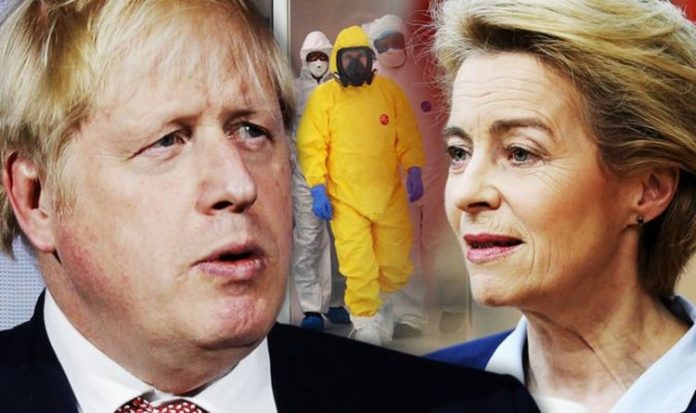While many hoped the agreement of a Brexit trade deal would put an end to EU-UK clashes, the coronavirus pandemic has pitted the bloc against Britain once again. The row this time is over access to vaccines – Brussels health commissioner Stella Kyriakides said this week vaccines produced in the UK should be shared with the bloc amid a fallout with pharmaceutical company AstraZeneca. She said: “We reject the logic of ‘first come, first served’ – that may work at the neighbourhood butchers but not in contracts.
“There is no hierarchy of the factories. You are aware in the contracts there are four factories listed but it does not differentiate between the UK and Europe.
“The UK factories are part of our advance purchase agreements and that is why they have to deliver.”
Brussels believes it will only get a quarter of the jabs promised to it by AstraZeneca, while the UK remains confident of getting all of its vaccines per the Government’s agreement with the pharmaceutical company.
But as the row intensifies, Prime Minister Boris Johnson’s spokesman refused to rule out the possibility that jabs made in Britain could be exported to the EU before all the UK’s orders have been fulfilled.
The disagreement is only the latest in a sequence of rows during, and in the aftermath of, the Brexit process.
One such debate was the UK’s outstanding payments that the country will make as part of its divorce agreement with Brussels.
When the issue first emerged, the UK was estimated to owe the EU around £39billion, but as of January 2021, £25billion remains to be paid according to the Office for Budget Responsibility (OBR).
This sum will be paid back by 2057, and £18billion of it will be paid back in the first five years.
The UK will also see money return from Brussels from things like its money in the European Investment Bank (just over £3billion) and the European Central Bank (about £50million).
READ MORE: Brexit: German politician warns ‘UK won’t be last to leave’
The UK will also receive a share of any money paid to the EU in fines that were imposed before the end of 2020, which is estimated to be worth about £1.2billion.
The Brexit trade deal has also left some fearing future clashes between the UK and EU over trade.
Ivan Rogers, former UK ambassador to the EU, warned back in November that a deal may not end disagreements, as the UK’s gradual divergence away from EU laws and regulation could spark fresh rows.
He said: “There are lots of forces driving a gradual divergence.
“The question is, is that divergence governable and relatively smooth and reasonably amicable while we remain close friends, or does it become bumpy, difficult, conflictual, or maybe worse than conflictual — constantly flaring up into trade wars as people bite chunks out of each other?”
DON’T MISS
EU’s ‘very existence under threat’ Italy’s Conte warned [INSIGHT]
Switzerland’s brutal rejection of ‘ridiculous’ EU membership [ANALYSIS]
Macron accused Brexit Britain of ‘taking EU hostage’ [INSIGHT]
The UK has agreed to level playing field measures on workers’ rights, as well as many social and environmental regulations.
The UK has the license to diverge from some of these agreements – forming more bespoke laws on its regulation.
To police this, both Brussels and London have agreed to a dispute mechanism, meaning if one side does not agree with divergence from certain rules, the mechanism can be acted upon.
This could lead to tariffs being placed on certain goods, risking trade wars if retaliation follows.







